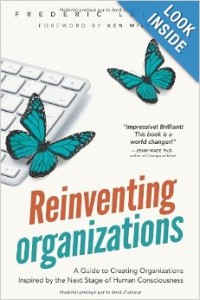
The way we manage organizations seems increasingly out of date. Survey after survey shows that a majority of employees feel disengaged from their companies. The epidemic of organizational disillusionment goes way beyond Corporate America-teachers, doctors, and nurses are leaving their professions in record numbers because the way we run schools and hospitals kills their vocation. Government agencies and nonprofits have a noble purpose, but working for these entities often feels soulless and lifeless just the same. All these organizations suffer from power games played at the top and powerlessness at lower levels, from infighting and bureaucracy, from endless meetings and a seemingly never-ending succession of change and cost-cutting programs.
Deep inside, we long for soulful workplaces, for authenticity, community, passion, and purpose. The solution, according to many progressive scholars, lies with more enlightened management. But reality shows that this is not enough. In most cases, the system beats the individual-when managers or leaders go through an inner transformation, they end up leaving their organizations because they no longer feel like putting up with a place that is inhospitable to the deeper longings of their soul.
Phi Beta Iota: Integral anything, i.e. integrity — is having another shot at capturing the attention of the public. The last time this was hot it came in the form of two books, both published in 1993: Gifford Pinchot's End of Bureaucracy and the Rise of the Intelligence Organization, and David Osborne and Ted Gaebler, Reinventing Government: How the Entrepreneurial Spirit is Transforming the Public Sector. Innovation was beat down and put back in the box after everyone went through the motions. This time around it may be more difficult — the Internet now makes it possible to create alternatives and route around (ignore and ultimately de-fund) those organizations that refuse to modify their protocols, paradigms, and products to conform to public expectations. As Clay Shirky and other are beginning to point out, the difference is not in the new ideas, but in the public's awareness of and refusal to allow the repression of the new ideas.
See Also:
Ken Wilbur and Frederic Laioux Discussion



